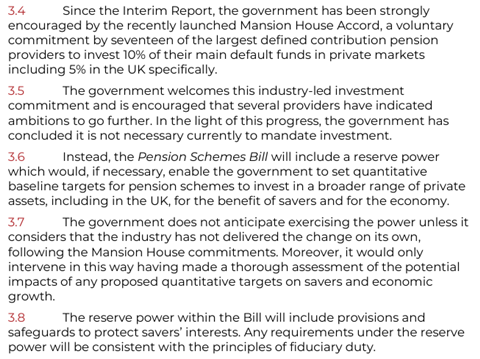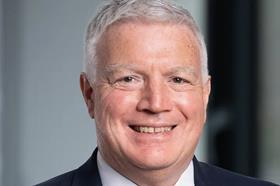The government plans to give itself powers in the Pension Schemes Bill to intervene in scheme asset allocation and LGPS fund mergers. We should probably be worried, writes Pensions Expert editor Nick Reeve.
Who do you trust with pension policy? We might all have to think hard about that after the events of this week.
The Pensions Investment Review was, as you must all know by now, published yesterday and met with a huge number of responses from across the pensions industry and beyond. I believe my inbox may have been physically groaning with the number of emails I received.
Key elements included the government’s rather pragmatic approach to defined contribution (DC) consolidation, and a more stubborn approach to the pooling of Local Government Pension Scheme (LGPS) assets.
(Incidentally, take a look at some of the response summaries to the ‘Fit for the future’ consultation. Did the government know what it wanted to do beforehand, and decide to press ahead despite minority support for some proposals?)
However, two elements have set alarm bells ringing across the sector.
A safeguard, or a sword of Damocles?

The government intends to grant itself ‘backstop’ powers over DC and LGPS funds in the forthcoming Pension Schemes Bill, which I am told behind the scenes could arrive as soon as next week.
For DC funds, the backstop relates to UK investment. Regardless of the positive reaction to the Mansion House Accord, the government seems intent on being able to force pension funds to invest in private markets, and UK private markets in particular.
The Pensions Investment Review’s final report explicitly states that the government does not anticipate ever using this power. If that is the case, why bring it in at all?
The Pensions and Lifetime Savings Association has expressed serious misgivings about the idea, but it was arguably best summarised by David Fairs, formerly of the Pensions Regulator and now at consultancy group LCP.

“Today’s announcement that the government is to take reserve powers over pension scheme asset allocation is a very sad one,” Fairs wrote on LinkedIn. “It opens the doors to this, and any future government, using our retirement savings for its own purpose. Potentially a purpose that sponsors and we didn’t agree to when we made those savings.”
I don’t know about anyone else, but I don’t want my pension fund’s asset allocation to be decided by politicians.
The LGPS backstop’s worrying implications
For the LGPS, I was assured by pensions minister Torsten Bell yesterday that the proposed backstop is intended only to ensure that there are no individual funds left on their own in the proverbial local government playground when all the pools have finished picking their teams.
However, the actual wording of the government’s plan implies something very different, as it seems to refer to mergers between LGPS funds rather than funds joining pools.
The ‘Fit for the future’ consultation response states (emphasis added): “The government’s strong preference is that mergers take place by agreement between administering authorities, but the power to merge pension funds will allow government to intervene in the event that local decision making is not effective in bringing about satisfactory arrangements.”
This is not just about ensuring every fund has a pool. This has worrying implications for any fund judged by central government not to be “satisfactory”.
If the Pension Schemes Bill does indeed emerge next week, I would advise we all pay close attention to how these two backstops are worded. You may be a fan of the Labour government and trust it implicitly not to abuse this power, but can you trust a future government?
There will come a point on this path at which we cannot turn back. The government must ensure it understands all the consequences of these highly controversial powers.
Nick Reeve is editor of Pensions Expert.

























